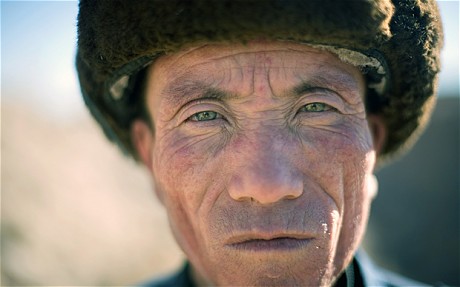Results of DNA analysis of people with green eyes, blond hair and long nose in a village in China show that they can be descendants of Europeans.

Cai Junnian, a 38-year-old man in Liqian village, became famous for his European-like appearance. (Photo: Telegraph).
For decades, people in Liqian village of Yongchang district, Gansu province have always said that they are more special than others in China. The majority of the villagers have many characteristics of Westerners such as blue and deep eyes, blond hair, and high nose bridge.
In the 90s, Chinese archaeologists were stunned when an ancient fortifications were found in Liqian village. It has the same structure as the defensive structures built by the Romans.
Villagers said they had never left China. But they worship bulls and like to watch bullfights like the Romans of the past.
Archaeologists discovered many artifacts that proved the existence of Romans in tombs in Vinh Xuong district. In a grave they found that the buried person was up to 1.8 m tall. That is the height that very few Chinese people achieve, but the height of the Roman soldiers.
Some scientists analyzed the Liqian villagers' genes in 2005. The results show that the ancestors of some villagers belong to the Caucasian and Xinhua Caucasian groups. In the recent DNA analysis, experts found that 56% of the villagers came from the Caucasian Caucasian strain.
These factors make anthropologists say that people in Liqian village may be descendants of the Romans, Telegraph said.
Experts at the Italian Research Center of Lanzhou University, Gansu Province, announced they would unearth a section of the Silk Road - a 7,000-kilometer trade route linking Asia and Europe more than 2,000 years ago. - to find evidence of the presence of a Roman army in China.
While the scientific community is studying, the unusual appearance has helped many people in Liqian village become famous. Cai Junnian, a 38-year-old man, is an example. With his wavy blonde hair, pointed nose and blue eyes, he was called by the locals Cai La Ma. Reporters, filmmakers, historians and genetic experts all over the world flock to the village just to find him. Cai was invited to attend meetings with the Italian consulate in Shanghai city. He even appeared in a documentary filmed by an Italian television station last year.
Luo Ying, another villager, is more European-like than Cai. He was hired by a film production company in Shanghai as a " visual representation " for them. A film producer in Beijing said he would invest millions of yuan to turn the story of Liqian village into a movie.
 'Fine laughs' - Scary and painful torture in ancient times
'Fine laughs' - Scary and painful torture in ancient times The sequence of numbers 142857 of the Egyptian pyramids is known as the strangest number in the world - Why?
The sequence of numbers 142857 of the Egyptian pyramids is known as the strangest number in the world - Why? History of the iron
History of the iron What is alum?
What is alum?